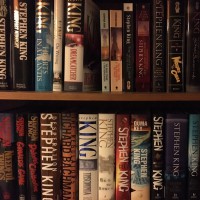While reading the epic (a project which for me spanned some 16 years), I haven’t consciously tried to imagine exactly how it would end, but of course ideas have floated around in my mind. The greatness of the conclusion to the tale is to me that I didn’t see it coming, but had no problems accepting it.
Of course, acceptance isn’t the same thing as complete happiness, and considering the amount of tragedy in the finale it’s hardly King’s goal. But it feels right.
Being in no mood to spoil the story, I will keep details at a minimum but I will say that the main boss at Algul Siento, residing over the patient destruction of the ever-important Beams, is a very striking representation of what might be called mundane evil. In fact, evil intent is far from his mind, although he’s perfectly aware of the nature of his job. After the exciting events here (and some equally important preceeding events) things swiftly take a turn for the darker. As in “Wolves of the Calla”, we are also reaquainted with characters from other King stories.
If the meta aspects (which are present, however much King hates the term metafiction) felt a bit jarring when first introduced, they feel less so here, and to my great relief they do not “shrink” the story into some witty punchline, as meta elements sometimes do. The increasingly apparent fact that the series is in part an exploration of writing and creativity does not take away from the story. In fact, it’s all a very fitting illustration of King’s recurring claim not to be in complete control of his stories.
Those with plenty of time on their hands will discuss the various logical aspects of the complete saga – now that all cards are on the table. I feel no urge to join the online discussions regarding King’s motives for this and that event or scene, a form of second-guessing which to me takes away from the experience. A favourite King line (from “The Mist”) comes to mind: “this is what happened”.
For my own part, I’ll just say that on an emotional level “The Dark Tower” is a dark, worthy and satisfying conclusion. Michael Whelan repeats his role as illustrator and has made heart-wrenching art of some of the most poignant moments – the details of which I will leave unmentioned.
So, thank-ya, King. This was a tale worth reading. In fact, it’s a tale which makes most other tales seem small in almost every aspect.
